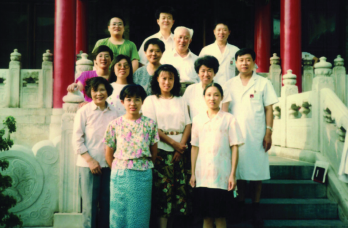
Harvepino / shutterstock.com
Rheumatology in China is a relatively young discipline, but it has developed exponentially over the past three decades. In this article, we review the history of rheumatology in China and advances in clinical care, research and education in this field.
The Founding Father
Naizheng Zhang, MD, is widely regarded as the father of rheumatology in China. Rheumatology virtually did not exist in China before 1960, and its development really started at Peking Union Medical College Hospital (PUMCH), founded by the U.S.-based Rockefeller Foundation in 1921, one of the most prestigious medical institutions in China.
Dr. Zhang, who served in the Department of Medicine at PUMCH, was chosen by the Chinese government to study at the Institute of Rheumatology, Medical Sciences in the former Soviet Union in 1959. Dr. Zhang returned to China in 1960 and initiated a Clinic for Rheumatology Service at PUMCH. The Cultural Revolution and subsequent economic difficulties, unfortunately, delayed the further development of rheumatology for over a decade.
Under the leadership of Dr. Zhang in 1979, rheumatology clinical and investigational units were established in a few major hospitals in Beijing and Shanghai. Several internists with a special interest in rheumatology became the pioneers of rheumatology in China, including Dr. Zhang, Yi Dong, MD, and Ming Jiang, MD, of PUMCH; Xinhua Cai, MD, and Guiying Shi, MD, of the Chinese General Army Hospital; and Minxin Huang, MD, and Shunle Cheng, MD, of the Shanghai Second Medical University. Training rheumatology fellows in China began the same year, and the first group of trainees included Fulin Tang, MD, Qingyu Zeng, MD, Mengxue Yu, MD, and Donghai Wu, MD, all of whom trained under the mentorship of Dr. Zhang.
In 1982, as the rheumatology workforce increased in size, a rheumatology consortium was formed. Three years later, the Chinese Rheumatology Association (CRA) was officially founded, with Dr. Zhang as its inaugural president.1
Serologic Testing & Epidemiologic Study

First row from left: Ms. Qinfang Song, Ms. Li Shi, Ms. Yanping Shi, Xiaodan Gan, MD. Second row from left: Xuejun Zeng, MD, Chunli Yan, Ming Jiang, MD, Yi Dong, MD, Mengxue Yu, MD. Third row from left: Xiaofeng Zeng, MD, Qingping Yao, MD, PhD, Naizheng Zhang, MD, Fulin Tang, MD. Not pictured: Dr. Fengchun Zhang.
In the early 1980s, rheumatoid factor was the only serologic test for any rheumatic illness available in China. Fulin Tang, MD, an attending rheumatologist at PUMCH, was sent by Dr. Zhang to study at the University of Southern California in Los Angeles. He brought back experimental methodologies for measuring anti-nuclear antibodies. These early serologic tests were gradually introduced to other hospital laboratories across the country.
